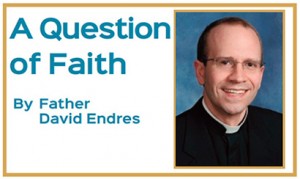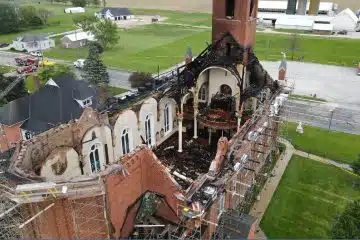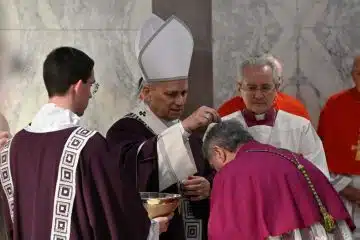Father Dave Endres for November: Can a soul in hell enter heaven?
 Q: The Catechism defines hell as “eternal separation from God” (1035). However, it says that at the last judgment “before [Jesus] will be gathered all the nations, and he will separate them one from another. . . And [some] will go away into eternal punishment, but the righteous into eternal life” (1038). If one dies before the second coming and is in hell, will he or she be re-judged when Christ returns? Is there a possibility of going to heaven at that time?
Q: The Catechism defines hell as “eternal separation from God” (1035). However, it says that at the last judgment “before [Jesus] will be gathered all the nations, and he will separate them one from another. . . And [some] will go away into eternal punishment, but the righteous into eternal life” (1038). If one dies before the second coming and is in hell, will he or she be re-judged when Christ returns? Is there a possibility of going to heaven at that time?
The permanency of heaven and hell and the impossibility of passing between them is witnessed to in Scripture. In the parable of Lazarus and the rich man in the Gospel of Luke, Lazarus is brought into heaven and the rich man is sent to the “netherworld.” From his place of suffering he begs the patriarch Abraham to send Lazarus to help him. Abraham responds: “Between us and you a great chasm is established to prevent anyone from crossing who might wish to go from our side to yours or from your side to ours” (Luke 16: 26).
To appreciate this permanence, one must understand that there are two judgments: the particular judgment and the universal judgment. The universal judgment will occur at the end of time – what is also called the second coming” or the Parousia (from the Greek for “coming” or “arrival”). Those who die prior to the universal judgment will be judged at the time of their deaths (particular judgment). The soul that is judged will either be taken into God’s presence (heaven), removed from the divine presence (hell), or will experience a temporary state of purification (purgatory).
At the time of the second coming, those who are alive will also be judged. For those already judged, the general judgment will serve as a confirmation of the particular judgment. However, there is one significant difference between the two. Whereas at the particular judgment, only the soul comes before God, at the general judgement, soul and body will be reunited and judged. This “resurrection of the flesh” is difficult to understand and has been intensely debated by theologians. It is professed in the Apostles’ and Nicene-Constantinopolitan creeds. In the Apostles’ Creed, we affirm, “I believe in … the resurrection of the body.” In the Nicene Creed, we say, “We look for the resurrection of the dead.” In both cases, our belief in the union of soul and body is in reference to the general judgment.
While in this world, before we die, we have the opportunity for second chances and can rely on the mercy of God. At the time of our judgments, God’s perfect justice will separate those souls that will experience life eternal with God and those that will not. For those already judged, a new verdict will not possible at the general judgment. At Christ’s second coming, the time of purification of souls (purgatory) will be concluded and souls will experience either union with or separation from the divine.
As we live out our Christian lives we should not focus on whether Christ’s second coming is near and which judgment we will experience, but instead seek God in such as a way as to be prepared to meet Him face to face whenever we are called into His presence. We can pray along with the early Church, “Maranatha!” (Come, Lord Jesus!), awaiting the end of the Church’s pilgrimage on earth and our hoped for entry into eternal life.
Father Endres is dean of Mount St. Mary’s Seminary of the West and the Athenaeum of Ohio. Send your question of faith to [email protected].













